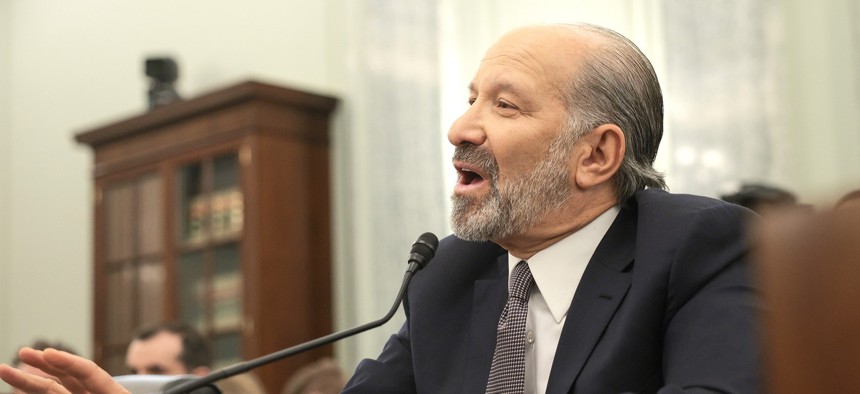Trump’s Commerce pick backs light-touch regulation in emerging tech policy

Howard Lutnick, U.S. President Donald Trump's nominee for Commerce Secretary, speaks during his Senate Committee on Commerce, Science, and Transportation confirmation hearing in the Russell Senate Office Building on January 29, 2025 in Washington, DC. Kayla Bartkowski/Getty Images
Howard Lutnick voiced robust support for U.S. leadership in AI and quantum information sciences alongside a light touch regulatory approach.
Howard Lutnick, President Donald Trump’s nominee to lead the Department of Commerce, advocated for a competitive posture in U.S. tech policy during his confirmation hearing on Wednesday, particularly to maintain leadership in artificial intelligence innovation.
Touching on a range of tech policy issues, including chip manufacturing and intellectual property protection, lawmakers on the Senate Commerce, Science and Transportation Committee gauged how Lutnick would lead economic growth if confirmed, with an overarching thread of prioritizing technological innovation over excessive regulations.
“Let's just unleash America for the benefit of America,” Lutnick said. “I think we've been too constrained for too long. That's over. It needs to be all about American ingenuity. And I think if you unleash American ingenuity, the scale by which we will outrun, outpace, outperform the rest of the world will be incredible.”
On the topic of how he would spur research and development in both AI policy and technology as Commerce secretary, Lutnick voiced strong support for existing agency efforts working to set standards for AI technologies, particularly at the National Institutes of Standards and Technology.
“I think NIST has some of the greatest scientists in the world, and they understand AI technology, quantum technology,” Lutnick said. “This is a central hub of knowledge of the American government, which I'm really excited to oversee. I think we should try to have a light-touch model like that in AI to set those standards so the world heeds our standards and goes with our standards.”
That light-touch model would focus on less regulation in a bid to stimulate continued innovation. In a response to Chairman Sen. Ted Cruz, R-Texas — who asked if Lutnick would refrain from following the European Union’s tech policy example and focus on the scientific and technical aspects of AI policy rather than the social elements — Lutnick said that he would.
Ensuring a protective digital trade policy was also a policy area Lutnick supported, with him highlighting the threat China poses to the U.S. in the battle for dominance in emerging technological innovation. He claimed that the new Chinese AI system, DeepSeek, is a product of stolen U.S. intellectual property.
“I do not believe that DeepSeek was done all above board. That's nonsense,” Lutnick said. “They stole things, they broke in [and] they've taken our IP. It's got to end, and I'm going to be rigorous in our pursuit of restrictions and enforcing those restrictions to keep us in the lead, because we must stay in the lead.”
Ensuring robust semiconductor and critical manufacturing efforts, modeled in the CHIPS and Science Act signed by former President Joe Biden, was also a priority area for Lutnick.
“I think my job is to give you the benefit of the bargain. You pass CHIPS and Science. My job is to bring domestic production of semiconductors home to America, and then we are going to attack the supply chain so we have the full supply chain [and] so we can be independent from a national security perspective,” he said.
Strategically-applied tariffs are also going to be an integral part of cultivating a strong U.S. manufacturing sector, Lutnick told lawmakers.
“We need those supply chains here,” he said. “It is vital to our national interest. It is time for us to take care of ourselves, and I think tariffs will encourage companies to come back and build in America, which is something I think our workers need.”
In keeping with the current cryptocurrency-friendly policy of the Trump administration, Lutnick shed light on potential policy surrounding stablecoins, which will hinge on leveraging AI to track and trace illicit activity using digital currencies.
“The way to do it is to require that anyone who is a U.S.-backed stablecoin must onboard U.S. law enforcement, and must allow U.S. law enforcement and our AI tools into their models so that we can go find and catch the illicit activity,” he said, adding that this technology can eradicate fraudulent and illegal activity from stablecoin transactions.






